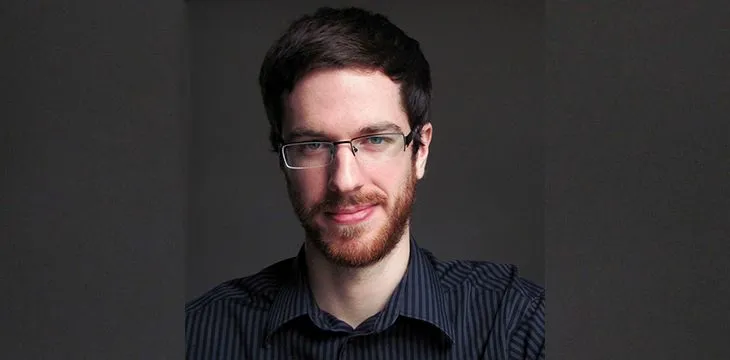|
Getting your Trinity Audio player ready...
|
It is comfortable to position yourself in the digital asset sphere by purchasing a certain digital currency and never seriously reviewing your decision. However, there are people who dive deeper.
Philosopher and author Steve Patterson is definitely one of them, and that is why we caught up with him to hear about his efforts in the digital asset sphere and his thoughts on Bitcoin.
Hi, Steve! Kindly introduce yourself and share your “Bitcoin journey” with us.
I first heard about Bitcoin somewhere around 2010 at an Economics conference. I thought it was interesting but didn’t pay too close attention. I remember being shocked when the price spiked from around $1 to around $10. I wanted to purchase some, but I thought, “There’s no way I’m spending 10x per Bitcoin compared to a short time ago!”
We see how well that turned out.
I became more involved, and by 2014, I kept getting messages from people asking about Bitcoin. I couldn’t point them to a simple introductory resource at the time, so that’s why I decided to write my first book on the subject.
I was extremely disappointed when Bitcoin Core hijacked the project. In my opinion, the small-block philosophy simply doesn’t work. Bitcoin was designed to scale with blocksize increases, and the Bitcoin Core developers have never proposed a realistic alternative scaling mechanism. The Lightning Network is 95% hype, and when you dig into the details, it cannot scale Bitcoin by itself. So, I see BTC as a dead project with failed leadership, though the market hasn’t realized it yet.
We found a lot of “proof of work” in your life concerning Bitcoin. You wrote a book called “What’s the Big Deal About Bitcoin?” and you are writing another one on Bitcoin right now. Kindly introduce us to your first Bitcoin book and tell us about your upcoming piece.
“What’s the Big Deal About Bitcoin?” is an introduction to Bitcoin that was written for your grandmother. I avoid technical jargon and focus on the basic concepts that anybody can understand. It’s a short book that can be read in a few hours. I’m pleased that it’s been well-received over the years, and organizations like The Foundation for Economic Education have given it out to students at their conferences.
However, the latest version was released in 2015, which means it’s currently out-of-date. The core concepts are still sound, but the system I describe is actually big-block Bitcoin (meaning BCH or BSV), not BTC.
I am currently co-writing a new book with a Bitcoin entrepreneur that explains the history and ideas behind the big-block philosophy. The overwhelming majority of early Bitcoiners were big-blockers—especially among relevant businesses in the industry—but after years of censorship, propaganda, attacks, and shoddy thinking, the small-block radicals successfully took over BTC.
So, our side has a remarkable story to tell.
You write this on your website: “In my own research, I have discovered a remarkably consistent truth: orthodox opinions are almost always wrong.”
Let us try to apply that to the Bitcoin sphere. What kind of orthodox opinions did you find “in Bitcoin” that should be challenged?
In my first Bitcoin book, I cover a handful of “orthodox opinions” that were wrong in 2015—that Bitcoin doesn’t have intrinsic value, that it’s only used by criminals, etc. But since then, the orthodoxy has shifted to another set of bad ideas.
For example, the notion that Bitcoin can be a reliable store of value without being a useful medium of exchange is naive. The idea that “Bitcoin can’t scale” has become popular, despite being completely incorrect. The idea that “software developers should be the primary leaders in Bitcoin” is also an orthodox opinion that’s totally wrong—and the history of BTC is a great example why.
More than two years ago, you discussed the BTC/BCH split in depth with Ryan X. Charles:
Since two years from uploading that discussion have passed, is there anything you would want to add to the topic from a nowadays perspective?
Well since that interview, Bitcoin Cash split in two. Now we have two big-block Bitcoins: BCH and BSV. There’s quite a lot that can be said about both projects and the differences between them. I’ve been participating in a series of discussions about the topic on Isaac Morehouse’s YouTube channel. For the past several months, we’ve covered BCH vs BSV in detail, exploring some deeper concepts in economics and business.
Our informal “show” has been a hit—affectionately known as “The Four Numpties”—but since we have many hours of conversation recorded, I wouldn’t be able to cover all the relevant topics in this interview. So, if people are interested, check out our show.
Watching people like you and Ryan X. Charles turning their backs on BTC, it seems safe to say BTC suffers from a severe “brain drain.” Why do Bitcoin thinkers, entrepreneurs and users literally flee from BTC?
Because it’s a failed project. When you dig into the details, BTC simply isn’t going to work, and their leadership is toxic. People who dive deep enough to realize this are not going to be building on BTC. So, naturally, the people that stay behind are less likely to be independent thinkers. They are more likely to have blind faith that the Core developers are highly competent—despite what the most seasoned Bitcoin entrepreneurs will tell you.
The censorship of online forums amplifies this closed-mindedness. They’ve successfully created echo-chambers which can be hard for newcomers to escape from. The BTC community also suffers from a mindless focus on price speculation—even when the underlying utility of their project has been destroyed—which dissuades real builders from their project.
Recently you had a discussion with investor Marc De Mesel about Bitcoin SV and BCH:
https://www.youtube.com/watch?v=xdzMB8S8b5c
From what I can tell, it was a very fair and highly valuable discussion to find out the truth about Bitcoin. You two came to a very interesting point at 01:25:45 in the video concerning the question whether Bitcoin has to scale first to serve enterprisal usage or has to have enterprisal usage demand before attempting to scale. I think this question is important, kindly share your thoughts.
It’s a chicken-or-egg problem. Should Bitcoin scale before it’s in high demand or afterwards? I tend to think the scaling capacity needs to be established beforehand. I don’t have any reason to believe that adoption will be linear, so we need to plan for exponential growth.
Signaling that Bitcoin has the ability to scale, right now, is a far better way to get enterprise usage than promises of potential scaling in the future.
If anything has been proven over the last decade, it’s that scaling decisions should never be left to a central planning board of software developers. Given enough time, they are guaranteed to make the wrong decisions on the wrong timeline and optimize for the wrong things. Bitcoin needs to be an unbounded protocol whose limits are set by the relevant economic actors: the miners.
What I was surprised about in your discussion with Marc De Mesel was the fact that there still seems to be a lack of information on the “non BSV side” concerning BSV and its recent developments, especially concerning already functioning Bitcoin SV driven apps like Twetch. How comes there is such an information asymmetry in the digital asset sphere in general?
The cryptocurrency world rivals the political world in terms of sheer amount of propaganda. It’s incredibly hard to get high-quality information, so it’s not surprising that there are large information asymmetries.
I see a similar pattern with BSV that I saw with BCH a couple of years ago. After the BCH split, the BTC community relentlessly attacked and dismissed BCH as a “scam” or reckless project. So, the masses were dissuaded from deeper research. The same thing is happening with BSV. After the split in 2017, I see a ton of people from the BCH community attacking BSV as a “scam” or reckless project. So, lots of people are unaware of what’s actually happening in BSV.
Of course, there’s a similar blindness that occurs when criticism comes from within a community. When I pointed out some problems with BTC back in 2015, I would get endless hatred from the BTC community. I’ve been pointing out problems within BCH over the past year, and I’ve gotten hatred from that community. I am currently pointing out some problems in BSV, and I also get hatred from this community. So, there are information asymmetries everywhere, and I don’t expect they’ll go away any time soon.
You seem to be very open to Bitcoin aside from the old “BTC vs. BCH vs. BSV” discussion. What are you personally looking for in Bitcoin, and in what ways do you actually use Bitcoin in your daily life?
I am unabashedly supportive of Bitcoin as a disruptive political phenomenon. I love the idea of the separation of money and state. I want to see a world where money emerges from the marketplace instead of by government fiat. I also want that money to be hard and inflation-proof.
I’ve been occasionally using Bitcoin for years whenever it’s convenient. My latest professional contract was paid in BCH. In terms of daily usage, I’ve lost count of the transactions I’ve sent just by using Twetch. I think decentralized social media networks have a bright future, so I’m eager to see where projects like Twetch end up.
Since you are a philosopher—which seems to be rare in the Bitcoin sphere—what thoughts on Bitcoin do you have coming from philosophy that we could learn from?
The philosophical method has lots of perks. For one, if you have a high-quality methodology for thinking, you can be ahead of the curve and invest in projects that are more likely to succeed. Similarly, you’re less likely to be persuaded by propaganda and group-think, which can reduce your losses.
I consider true information to be the most highly valuable good, both personally and professionally. The closer you get to truth, the better your life becomes, and the better your business becomes. So, the closer that Bitcoin entrepreneurs get to the truth—about what people really value and how to produce it—the more valuable their projects become.
Thank you very much for your efforts and your time!
My pleasure. Thanks for inviting me.

 07-03-2025
07-03-2025 





